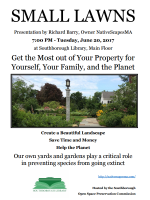Above: Open Space is bringing in an expert on small lawns to talk about the win,win concept to the community next week (images from NativeScapesMa.com)
The Open Space Preservation Commission is sponsoring another event to support wildlife in Southborough. An expert will explain how yards can be converted to “Small Lawns”:
Learn how yards and gardens play a critical role in keeping many species from becoming extinct. Also discover how to design and grow native and edible plants – for beautiful, functional, and sustainable landscapes in Northeastern Massachusetts.
The program takes place at the Southborough Library on Tuesday, June 20 from 7:00 – 8:30 pm.

The flyer pitches, reasons for converting more of your lawn to native plantings are:
- Create a Beautiful Landscape
- Save Time and Money
- Help the Planet
OSPC member Freddie Gillespie explained to me that the seminar fits with the group’s overall mission. She writes that “protecting open space for wildlife needs more than just protecting a parcel here and there.” There need to be connections. Gillespie believes that what we do in our individual yards has a critical impact.
The presentation will be given by Richard Barry, owner of NativeScapesMA. On his company blog, Barry explains the concept. Apparently, the wildlife support goes beyond just helping pollinators:
Contrary to popular misconception, our own yards and gardens have a critical role to play in keeping many of our species from literally becoming extinct. There just isn’t that much pristine wild natural land untouched by humanity left anymore. Our wildlife such as birds, butterflies, frogs, toads, and many others depend on habitat we provide in our yards. We can both beautify our living space and also provide what wildlife such as birds and butterflies need to live through our gardening and yard care choices.
And according to Barry, converting more of your yard to native plantings is a win, win with much lower maintenance for the homeowner:
Native plants in the right place as well as many edible plants require no watering once established even in the driest conditions, no fertilizing, and certainly no spraying of pesticides or other toxic chemicals.
It’s not about eliminating lawns, just making them smaller:
Many people have fallen prey to the lawn and garden care business’s advertising that we all need to have large areas of manicured lawn and non-native “ornamental” garden plantings that require consistent high inputs of fertilizers, pesticides including spraying trees, and maintenance such as mowing, trimming, and blowing. . .
Keep the lawn where it’s most useful or desired and replace the rest with more attractive and functional plantings that require much less care.


